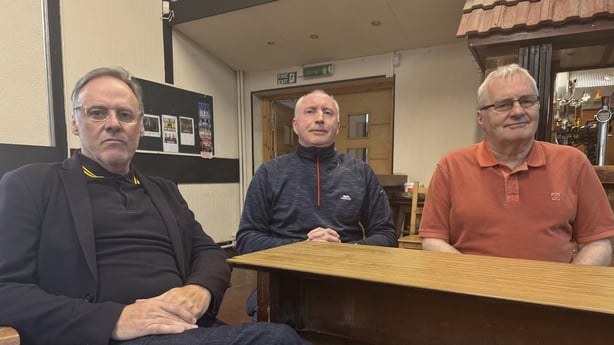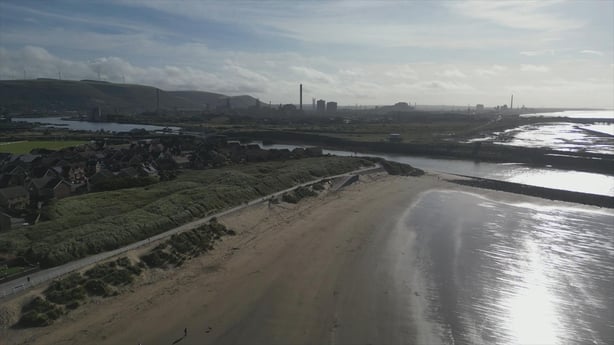Earlier this year the final blast furnace at Port Talbot steelworks in south Wales shut down.
It marked the end of an era for the coastal town which has been a major steel producer for decades.
However, the closure also resulted in a significant loss of jobs, with around 2,000 workers set to be made redundant before Christmas. This figure does not include the many contractors who will also be let go.
The closure however has also marked another chapter in the decline of heavy industry in Wales and a growing sense of economic inequality in the UK.
We need your consent to load this rte-player contentWe use rte-player to manage extra content that can set cookies on your device and collect data about your activity. Please review their details and accept them to load the content.Manage Preferences
Tata Steel has announced plans to open an electric arc furnace by 2028 which will result in a significant reduction in emissions, however it will also require a smaller workforce.
RTÉ News visited the town of Port Talbot to see how the community is coping with the recent closure and the economic concerns that have flown from it.
A town left in limbo
Peter Johnson is a former contractor at Tata steelworks. He is now general secretary of the local 'Gas Social Club', which has many steelworkers in its membership.
The walls in the dancehall are adorned with posters of tribute acts from Celine Dion to Elvis Presley. "The best tribute acts in the UK," according to Mr Johnson.
The club also runs several clubs including table tennis and rugby clubs, to astrology and motorcycle clubs.
Mr Johnson is a well known figure in the community and he is recently noticed a marked decline in morale.
"The mood is decreasing day by day, week by week, month by month, because it is starting to hit home, the extent of the job losses", he explained.
He said the closure has left many in limbo, with the full effect not likely to be felt until the New Year.

Mr Johnson also believes that the closure marks another chapter in the long decline of heavy industry in Wales.
"We're a steel making town and South Wales is known for heavy industry", he said. However, he has watched major companies close down over the decades.
"Merthyr Tydfil, which is only up the road, that is where heavy industry started in the UK, which we're very, very proud of. Now it's taken away from us", he lamented.
The green argument
Tata Steel has pointed to a number of factors which it said forced it to close the blast furnace in Port Talbot.
Those reasons include aging steel-making assets, customer demand for green steel and future carbon taxes. Ultimately it was losing £1 million per day.
However, Tata Steel has also signed up to plans to build an electric arc furnace at the site by the end of 2027. The UK government is committing £500 million to develop the facility.
It is a move which will significantly reduce emissions and improve local air quality. However, it will not stop the job losses right now. And even if it does open, as planned, it will require a smaller workforce.
Alan Coombs is a worker facing redundancy and is a union representative. He has watched as people have been handed their notices in recent weeks, describing it as "tragic to see people not knowing how they're going to support their families".
He does not buy the argument that the closure was inevitable due to the plant's harmful impact on the climate.

"It does upset me and make me angry when I see blast furnaces closing on my doorstep and they open new ones in India", he said.
In fact, he is not alone. Greenpeace the environmental organisation, also believes that efforts should have been made by the previous Conservative government to develop an industrial strategy and wind down the blast furnace at the same time as developing the electric arc furnace or hydrogen based steelmaking, in order to limit job losses.
Paul Morozzo is a senior campaigner with Greenpeace. He explained that steel is an essential material for the transition to cleaner power and it is used in technology such as wind turbines.
"It's essential in the manufacturing of electric vehicles, it's essential for the framing of solar panels etc,. Most elements of the green transition do require steel so there's no reason to close down the steel industry, we're going to need a steel industry for decades and decades to come", he said.
The economic effect
It is also not just the soon-to-be workers and contractors at Tata Steel that face an uncertain future, so too so the local businesses.
One such business is Barista’s Coffee Shop, a popular café in the heart of Port Talbot.

Melanie Cole has been working there for years and took over as owner just a few months ago.
"We're very popular with the workforce down there. They all like to come in for coffee and breakfast and everything like that but if they haven't got the money they won't spend", she said.
Ms Cole is also somebody who demonstrates how the steel works has become part of the identity it Port Talbot.
"My father worked there, his father worked there so you know everybody from generation to generation have worked in Tata steel", she said.






